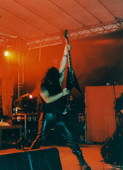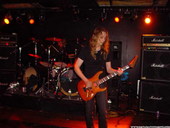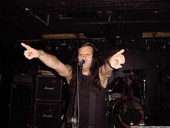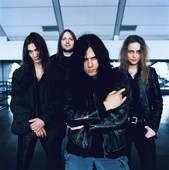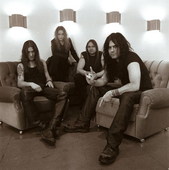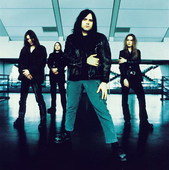Kreator
Two Sides Of Music Business
31.05.2013
Архив интервью | Русская версия*** ARCHIVE ITEM - DATED 2003 *** Unlike the American thrash metal scene that fell apart or mutated into something absolutely un-thrashy in the early 1990s, German thrashers of the first generation have always been there, despite all ups and downs that are inevitable for bands with a 20-year history. And Kreator, like Metallica, Sepultura and Napalm Death, have a special place in the hearts of Russian fans, because they were brave enough to play here as far back as 1992. Guitarist/vocalist Mille Petrozza called us from Essen, Germany, shortly after the release of Kreator’s first live CD and DVD called “Live Kreation” and we had a great time chatting…
(EDITOR'S NOTE - THE YEAR 2013: Our first anniversary year is now over, but we keep on putting up archive items that our authors penned before starting to write for HeadBanger.ru. We polled the visitors of our Vkontakte page, and poll results clearly show that these old interviews are still of interest to the readers and they want these texts to be available again to the general public. As to ourselves, this is a good opportunity to re-live some of the great moments of our careers as journalists, and we are naturally eager to share them with you...)
First of all, let’s clear one thing right now – what is the right pronunciation of your band’s name – is it [kri ’ator] or [kri ’eitor]?
It depends where you’re from. (everybody laughs) Sometimes people from south of Europe call us [kri’ator], and people from the States say [kri’eitor]. I think people from Russia say [kri’ator] as well. It depends, you know, whatever you’re happy with. It’s free for your own imagination.
Let’s pass on to the live CD and DVD that Kreator has just released. As far as we know, you recorded 22 shows around the world, but only used material from six of them. What criteria did you apply to the recorded material, why did you choose these particular six concerts?
First of all, we needed good atmosphere and a good crowd reaction. Some of the places that we played didn’t sound as good as others, so some of the shows that we recorded didn’t really have a cool live sound. We had these shows in Brazil and Korea which were among the better ones soundwise. Then we had some songs from France, some songs from Greece, and some from Germany. That made sense because those shows just sounded best, you know.
You know, it seems a bit strange, because Greece is known for very poor sound and acoustics. Many metal bands say that…
I guess we were lucky for we had a good sound. And we always bring our own sound system with us as well.
How long did it take you to put together the history section on the DVD?
Oh, long. You gotta look at it this way: we had to fast forward several ancient VHS tapes to look for material that we could use. That was a little bit of pain. But that was fun in the end of the day, I mean, the results are what matters, and I think we managed to give our fans some sort of idea of how the first days of Kreator were happening and what was happening back then. I think it made sense, what you see on the DVD is like a rough and very compact version of what was going on when we were starting the band and up to now.
As we haven’t seen the DVD yet, what is the earliest footage on it? What is the date of the earliest footage?
The earliest date in the history section is 1982, which doesn’t mean that the band formed in 1982. We were going back to the Tormentor times, our band was called Tormentor, and the early outfit of Kreator was playing in Tormentor as well, so we would go back to the first day the members of Kreator ever became musicians. That was in 1982 when we had the first drum kit. That was the birth of the band, we bought a drum kit, and that was the point from where we went. And 1985 is the date of Kreator’s birth.
Are all the materials taken from your personal archive or did you use some bootleg stuff?
Yeah, some bootleg stuff, of course.
Why didn’t you include the video for “Terror Zone” in the DVD?
Ah, “Terror Zone” wasn’t the official video for the “Coma Of Souls” album (1990). The official video was “People Of The Lie”, “Terror Zone” was just some kind of video that appeared on the “Hallucinative Comas” VHS cassette (1991). A lot of people played it on TV though.
We actually thought you didn’t include it because it’s too violent…
No. (laughs) No it’s not. (continues laughing)
By the way, who are the people filmed in this video? Are they your friends or professional actors?
They are actors that we knew from a theater.
And who came up with the script of this video?
The script was done by Andreas Marschall who does our cover artworks as well. He’s a genius, man!
The “Live Kreation” CD includes just one song from the “Endorama” album (1999), the DVD does not include songs from “Endorama” at all. Do you now consider that album to be a mistake?
You gotta look at it this way: if we play “Endorama” songs, we would have to take digital equipment on the road, and we didn’t bring that. So we were only able to play the songs that we could play as an acoustic band. The only “Endorama” song that we could do like that was “Golden Age”, and I think “Endorama” would have been possible as well, but we didn’t have the time to record that one. I don’t consider that album to be a mistake at all, I think it’s one of the best Kreator albums ever.
Have you noticed what the audience’s favorite tracks from this set are? I mean the songs to which people react the best…
I think they responded the best to “Violent Revolution”, they seem to like it as much as the old stuff.
What are your impressions from visiting Russia?
It’s great, man! I like it there a lot. We almost came this year, but it didn’t happen because the people who wanted to organize the show pulled off all of a sudden. I don’t know what happened. We’re working on some visits later.
You’ve played in Moscow twice – in 1992 and in 200. Which time did you like better?
I think the one in 1992 was very chaotic, and the one in 2000 was very nice. But both were good.
Can you tell us more about the gig that you played here in 1992? We were too young to witness the event… Who brought you over that time?
I think some guy from another band, Metallus Spider or something like that. (Obviously Mille is talking about Sergei Troitsky aka Pauk (spider) from Russian thrash metal band Korrozia Metalla – ed.)
What bands did you play with, for how many days did you stay in Moscow?
We played one day, and we stayed in Moscow for a week, I think. It was fun, lots of fun.
Now let us ask a few more specific questions about some of your songs. There is a short intro to the song “Violent Revolution” called “The Patriarch”. Why did you choose this title – does it have any meaning?
It’s because this piece is very gloomy. You know what a patriarch is, and always have an association with a very threatening situation when I hear this little piece. We wanted it to stand on its own, and that’s why we called it “The Patriarch”. It fits the lyrics of “Violent Revolution” well, because if you think about it, we have had patriarchy for the last 2,000 years or something, and “Violent Revolution” is a song against society. So it links, you know. Maybe we should try and let some woman be a president or something, maybe something would change. (laughs)
The song “Europe After The Rain” (from the “Renewal” album) pictures a quite pessimistic view of the future of Europe. Have your views on the unification of Europe changed since 1992?
Yeah, in a way it turned out a little better than I thought it would be, but then again, it’s a big rip-off. (laughs) When you take the money, the euro, man, this is hilarious, this is fucking ridiculous what they did. It’s such a big rip-off that people almost can’t afford to buy anything anymore. It’s almost a whole new currency, that’s actually what it is, they take two Deutschmarks and give you one euro, so they rip you off big time. (laughs)
We remember when we were in Germany a couple of years ago beer was worth one Deutschmark, and now it’s one euro…
Yeah, exactly. That’s how they rip you off, and nobody does something against it. Of course it helps certain countries to recover, to get out of their financial crisis, but then again, it’s also a big rip-off, it’s just as simple as that.
What is the song “Black Sunrise” (from 1997’s “Outcast”) about?
It’s about someone who I knew and who killed himself by using heroin.
What inspired you to write such hateful songs as “Catholic Despot” and “Progressive Proletarians” on the “Cause For Conflict” album (1995)?
I have a proletarian background, and I think it’s obvious when you look at it that the working class is being abused and being left alone. Most of the time in any country the government is very corrupt. That’s what the songs are about, that’s what most of my lyrics are about. It’s about trying to fight this whole thing, I know it’s very hard, but then again, if you don’t try you don’t know if you fail or not. If you don’t try, you’ll lose anyway. It’s about the struggle against your place in the society and keeping your individual life. That’s what all these hate songs are about.
Can you describe the songwriting process in Kreator at the moment? Who is responsible for music and lyrics?
I am responsible for the most part. I write songs at home, and then I play them to the other guys and we arrange them together. That means it’s a long process, it sometimes takes more than two years or something to come up with some new material, but I have very high quality standards, and that’s why I wait until everything is done and everything seems to be ready so I can play it to the other people in the band. And everybody adds his own influence when it comes to musicianship.
Was it somehow different when guitarist Tommy Vetterli was in the band?
Yeah, he was helping me a lot, he was even coming up with riffs and stuff. He had very good ideas.
Are you satisfied with your new guitarist Sami?
Yeah, he’s great too. He’s a really different personality than Tommy is, but he’s very laid back and very easy to work with.
You’ve worked with an enormous number of famous producers over the years, including Andy Sneap and Randy Burns. Whom do you consider the best from the professional and human standpoints?
I did like Randy Burns as a person and I learned so much from him that I’ll always have to thank him for that. He made me grow up in a way. (laughs) I was a little kid when I met him, and after “Extreme Aggression” (1989) and “Coma Of Souls” I was very mature in a way. Not mature enough, but, you know, I was a step further from being a kid. As to Andy Sneap, I’ve known him for years and we’ve been good friends since his days in Sabbat. He’s so professional and so laid back, and it’s great to work with him because he’s a total metalhead, which makes the whole thing a big trip. He’s very critical when it comes to musicianship and also ideas sometimes, and he puts everything in shape. When I have a rough idea which is OK but not very convincing, he’ll make it convincing.
So you like being criticized by him…
Yeah, of course.
Do you take criticism from him easily?
I have to, because I only have my point of view, and I lose track sometimes, I’m only a human being. I cannot write all the songs, I cannot be responsible for all the organization of the band and the production as well. Someone has to be responsible for the production, and he’s the perfect guy for that.
You co-produced “Endorama” yourself together with Tommy. Have you ever thought about producing other bands?
I’ve only produced a flamenco project, but that’s about it. It’s very nerve-wrecking, and you have to be a psychologist for producing bands. (laughs) You would think it’s only about music, but it’s not. It’s about personalities, it’s about human beings, you have to find the weak and strong spots of every band, and then you have to put weak spots out and kinda amplify strong spots. And this is not really easy, you need to concentrate a lot. It’s a lot of work, man, it’s not really fun. (laughs) But it depends. You have to get in the right mood for it.
Apparently you receive demos from new bands. Have you ever had an idea to produce any of them?
I thought about that, but as long as I get a really good and convincing tape, I’m not really interested. It really needs to be something in which I can see potential, and it’s very hard nowadays. It’s not very easy to convince me.
Have you heard any tributes to Kreator?
Yeah, there are two albums out there. And so far I heard one album, which I thought was OK, and I heard a couple of Kreator covers, sometimes they’re good, sometimes they’re not so good.
If you had the chance to pick up bands for a tribute record, whom would you invite?
Oh man, I would invite Johnny Cash…
Johnny Cash doing a Kreator song???
(laughs) Yes. I’d also invite Fields Of The Nephilim, Nine Inch Nails, Rush.
I think Trent from Nine Inch Nails would go for it… He likes doing remixes.
(laughs) Yeah! But it would be very unrealistic, so forget about it. (cracks)
What song would you like him to do?
Any song, I don’t care. He’s a genius, you know.
Going back to the Tormentor days, how many demo tapes did you do?
We did two. One was called “Blitzkrieg” and the other one was “End Of The World”.
“End Of The World” was re-released as a bonus to the album “Endless Pain” (1985). Is there any chance that you will re-release “Blitzkrieg” one day?
Maybe, if there’s gonna be some special issue in the future, we’ll put it on. I don’t know where it is stored, I don’t know who’s got a copy. (laughs)
By the way, will there be any bonus tracks or any special packaging for the Japanese version of “Live Kreation”?
We stopped doing that. I don’t see a reason why we should give people in Japan more songs than to others, sorry. (laughs) We quit doing that, no way. If there are bonus songs, they will be for the whole world, not only for one country.
And why is the audio version of “Live Kreation” is longer than the concert section on the DVD?
It’s because the DVD has other songs. On the DVD we have “Tormentor” and “Flag Of Hate” from a different concert, which doesn’t have the same sound quality as the rest, so it’s some kind of bonus. And on the DVD we have so many videoclips that we thought about making those two things differently, not putting out the same stuff twice.
A lot of bands say nowadays that Noise Records treated them very bad or even ruined their career. What are your impressions from working with Noise Records?
(sighs) There were ups and downs. I wouldn’t say they ruined our career, because they helped us a lot. They were one of the first labels that dared to pick up Kreator in the early days. I think sometimes bands can be very critical when it comes to record companies, and bands are sometimes very unfair, they blame record companies for their lack of talent. (laughs) It’s not only the lack of talent that is to blame, sometimes it’s just not the right time and place. Don’t get me wrong, I’m not saying that a band that’s bad could be big on a big label. You need to be at the right place at the right time. Of course bands always want more that can actually happen in reality, but I think it’s sometimes very arrogant of bands to say, “OK, I’m only not famous because I’m on this record company.” It’s not that easy. The people that work at record companies work as hard as rock musicians sometimes. They give you the opportunity to release your stuff. Not everything that Noise Records did to me was correct, they probably ripped me off here and there, but then again, they also helped me a lot. It also depends on yourself. You need to find the strength to work with those people, not against those people.
What is the worst thing that music industry people have done to you?
Ripping bands off, that’s what they always do, that’s why they’re there, you know. (everybody laughs) But then again, it’s giving and taking, they also give you something. Like I said, they work for you, but the price is that you have to give them most of your earnings, which makes sense as long as they give you the part that you deserve. I can only give the new bands one piece of advice: read your fucking contract!!! (everybody laughs) It’s not that hard, you know – spend some money on a lawyer, and things won’t be that bad.
Where is your original bass player Rob Fioretti at the moment?
He’s probably at home raising his kids. (everybody laughs) He’s out of music, he’s not playing or anything nowadays anymore.
Why did he leave Kreator in the early 1990s?
He wanted to settle down, raise a family and be a family man.
How did you get into contact with your current bass player Christian Giesler?
He was rehearsing in the same rehearsal room that we were, so we knew him, he was around.
Where did he play before joining Kreator?
Some local bands.
In a related question – if you were offered, say, 10 million U.S. dollars for a reunion tour in the Mille/Ventor/Rob/Frank Blackfire line-up, will you agree?
Yeah, of course, for 10 million. (everybody cracks)
Do you think the guys will be up for it?
No. It doesn’t make sense, to be honest. I mean, what would be the difference? Our new bass player plays a lot better than Rob plays now. Rob hasn’t touched the bass for 10 years. And Frank, he’s still playing guitar and writing, he has his own band and everything, but I think we have to let the past rest sometimes. The past is the past, and this is now. I think the Kreator line-up nowadays is the strongest ever, and why should I change that? But for 10 million bucks – of course! (total laughter) Ten million is a little bit unrealistic, don’t you think? (cracks)
A lot of black metal bands consider your early stuff one of their biggest influences. What is your opinion about black metal?
I like some of the stuff. I think some of the black metal stuff like Dimmu Borgir or Immortal are very good. There’s some sort of energy that I really like. Most people that I know in black metal bands are very nice.
Why did you do a cover of the Sisters of Mercy classic “Lucretia My Reflection” for the “Voices Of Transgression” compilation? Are you really into 1980s gothic rock?
Oh yeah! It’s one of my biggest influences. I like all this stuff, anything from Sioxie And The Banshees to The Cure to Joy Division, and Fields Of The Nephilim is one of my favorite bands. I’m really into this stuff.
How did the Israeli band Nail Within persuade you to do guest vocals on their record?
Oh, that was some kind of favor. I was planning a vacation in Berlin, and the guys were there while I was on vacation. So they asked me if I could come down to the studio, and I said OK. You know, I like the guys, and I like Thomas Lindberg from At The Gates (another guest singer on that album – ed.), they’re very nice people. And to me it was just fun.
What do you think about the current state of thrash metal? Have there been any young thrash metal bands in the past few years that you consider worthy of attention?
Yeah, there’re a few. There’s a big energy level, especially in Sweden and Scandinavia in general. I think it’s great that there are so many new bands coming out. It think it helps the scene a lot, and I’m always inspired by the new stuff that’s coming out. It’s the same as with everything in music, it’s giving and taking. You influence bands, and then you listen to them and they might influence you in a way, not that you get ideas for your riffs, but they motivate you, maybe.
What do you think about the current wave of reunions – Dark Angel, Death Angel, all these Bay Area thrash guys? Do you think it’s a good idea for them to come back?
I have no idea. I mean, if they manage to do new albums that are good, why not? But let’s wait and see what happens. It depends on the band. I think for Death Angel it may make sense, because they’re great musicians and maybe they’ll do a great new record. I think the new Exodus is gonna be good. I have a lot of respect for those bands, don’t get me wrong, but I always wonder why they split up in the first place. (laughs) Not Exodus, they never really split up, but a lot of those bands did. Why? Where have you been? What have you done for all these years?
Well, they say it was because of their record companies…
Of course, yes, but that’s a fucking lame excuse, I’m sorry. If you people believe in the music, then fucking go for it no matter on what level you play. You should always be really able to fight. I always see it like this: if there are good times, the band go, “Yeah, great, we believe in the music, and blah blah blah.” When there are bad times, they all of a sudden split up! This is not what the metal thing is about. Just imagine Motorhead splitting up every time they have problems with their record company. (everybody laughs) They have survived for 30 fucking years or something, you know what I mean? There are always ups and downs, you gotta be prepared for that.
When can we expect a new studio album from Kreator?
Not before next year, the middle of next year.
Have you come up with new riffs or something?
Yeah, I have riffs, but I don’t have many songs. I have three songs so far, and I have 1,000 riffs, but I need the songs. An idea for the song is the most important thing.
Will the new stuff be similar to “Violent Revolution” or will you change the music dramatically once again?
I don’t know, we’ll see. But it could definitely be a mix of everything.
To end this up, can you say a couple of words to Russian fans of Kreator?
Yeah, I hope that we’ll be able to play Russia soon, because we really like it there. Sorry for the cancellation of the last Moscow experience, that wasn’t our fault. We’ll see you next time!
Kreator on the Internet: http://www.kreator-terrorzone.de
Special thanks to Maxim Bylkin (Soyuz Music) for arranging this interview
Roman “Maniac” Patrashov, Felix Yakovlev
July 17, 2003
(c) HeadBanger.ru

